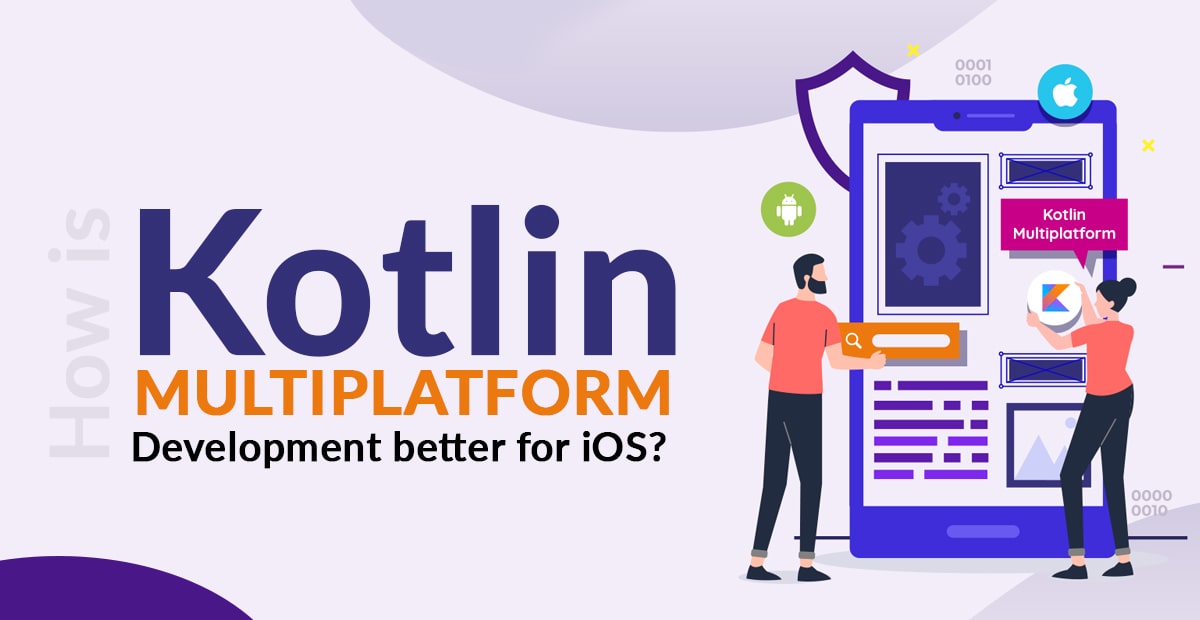How is Kotlin Multiplatform development better for iOS?
Published On : February 24, 2023 Category(s) : Kotlin Development
Benefits of Kotlin: DRY, which stands for “Don’t Repeat Yourself,” is one of the most fundamental programming concepts. Nonetheless, it is frequently required to repeat a large amount of code in order to design an app that is compatible with different platforms. Programming best practices dictate that you should strive to reduce repetition. And the more code that is shared across platforms, the less duplication there will be, which will result in better code.
Consider the current project you’re working on for iOS and ask yourself whether it’s accessible on any other platforms, such as Android or the web. If that’s the case, I was wondering how much of your iOS app’s logic is shared with its equivalents on other platforms. If this is not the case, but making your app compatible with another platform is on the to-do list, how much of your current work will need to be replicated before you can go on to the new platform? In any case, the answer is most likely going to be “a lot.”
Kotlin Multiplatform (KMP) enters the chat. Kotlin is a programming language that is 100% compatible with Java and has a strong similarity to Swift. Now, let’s find out how is Kotlin Multiplatform development better for iOS.
What exactly is Kotlin MultiPlatform?
Kotlin Multiplatform mobile is stylistically-typed, an open-source and general-purpose programming language that allows one to create the cleanest code possible. One of the many other major benefits of Kotlin multiplatform is support for multiplatform programs. This multi-platform reduces time spent writing and maintaining the same code for different platforms while retaining flexibility. It is used to build ultra-modern, scalable, and secure applications. Therefore, it has a shorter development schedule as nobody ever wants to get locked in on a huge app. (Economical IOS Development)
Benefits of Kotlin: Why Kotlin multiplatform is better for iOS?
It allows iOS platform users to store the reusable code pieces and can be used again for two or more versions of the app.
Faster Development-
With the introduction of a modified development cycle, the feature delivery accelerated. For instance, if an iOS developer would add model objects, networking, business logic, and unit tests to the multiplatform module, then an Android developer would just plug the feature in. This whole new process helped cut the development time exponentially as the users were developing features. Also, this easy code sharing saves the developers a lot of time and effort, making app development faster and much easier.
- Better Code Quality
This second improvement had some unexpected positive outcomes as it helped in better communication, eventually leading to finding more corner cases and logical errors before the development. And not only this, but it also led to great functional consistency between the apps. Another benefit was the inherent modularity and testability of the written multiplatform code.
- Maintainable code
Now, it has become easier to onboard new developers without the need for extensive knowledge transfer. It was not difficult for a new developer to understand what was going on with the ongoing project because of the modular and testable code.
- Significant savings
Using Kotlin for mobile and web development makes it possible to save 30-50% of the development time. It can cut up to 40% of code lines. It saves money since the customer does not need to pay the developers for doing the same code again.
- Fewer bugs
As stated earlier, it allows developers to create the cleanest codes. And even if some bugs penetrate the code, it makes it possible to find and fix them before runtime. Hence, saving a lot of hard-earned money and valuable time.
- Team efficiency
It helps the teams interact effectively and connect and communicate properly so they can be of more use and value, as now they can focus on the next tasks properly without much confusion and proper communication.
- It is modern
In 2012, Kotlin was open-sourced, but in august 2020, Kotlin 1.4 was released, and Kotlin Multiplatform Mobile went into the Alpha base. Today, it is backed by a strong community of developers and tech enthusiasts worldwide. Kotlin’s concise code practices, several improvements such as null-pointer safety and extension functions, and IDE support make it one of the most modern, efficient, and faster programming languages.
Frequently Asked Questions (FAQS):
Is Kotlin good for multiplatform?
Kotlin Multiplatform is ideal for use in the creation of new applications, especially those that may include a significant amount of code that is platform-specific. You are able to construct cross-platform mobile apps with the help of Kotlin Multiplatform Mobile and share common code across Android and iOS. This code can be used for things like business logic, connection, and more.
Does Netflix use Kotlin multiplatform?
Kotlin Multiplatform (KMP) was originally adopted publicly by Netflix, making it the first FAANG business to put it into production. The group is looking to reinvent the physical production of film and television by using KMP and mobile technology.
Is Google replacing Java with Kotlin?
Java has not been superseded entirely by Google. Kotlin is being supported as a development language on Android, according to a statement made by Google.
Conclusion
Therefore, using Kotlin is a win-win situation for iOS users. It is clear, quick, and clean, which sums up everything in terms of benefits for any app development. It is known for its concise and smooth syntax. Optional sharing, lower risk, and smooth interop without any 3rd environment contribute to making it worth a try for any user for their next cross-platform project. So, if you are an iOS user and want to save money and time, which are both precious elements of life, then without thinking twice, get started with Kotlin and never look back.

Leave a Reply